
There’s a lot of pressure to perform these days. In games, I mean. Gaming is a casual hobby to some, but with the rise of professional eSports tournaments, it has become a career to others. This year’s world championships for the PC online battle game Dota 2 offered a prize fund of $10m, and other popular competitive titles like League of Legends, Smite and Call of Duty offer similarly large pay-outs as well as lucrative sponsorship deals and salaries for top players.
For much of the time, however, players of all abilities end up competing in the same environments. When I play Dota 2 I’m in the same arena as professional players – the only difference is I react slower, make bad decisions and generally, am not as good. And that’s OK, as far as I’m concerned.
A lot of games market themselves toward the competitive end of the playing spectrum with a view to creating tournaments that reward real money or prizes. Recent arena-based games such as Transformers Universe and Nosgoth have put a key focus on competitive matches, with developer Jagex adding a dedicated livestreaming “arena” to its office and Nosgoth’s ESL (eSports league) starting up before the game has even left closed beta.
Call of Duty, meanwhile, has added Com Cast and Oracle features specifically to make the games more interesting to spectators, and has included new maps, modes and league options to entice pro-gamers. With Overwatch, Blizzard’s competitive team-based first- person shooter on the horizon, this is a trend that shows no signs of stopping.
But increasingly, even at a casual level, there’s a pressure to perform to league standards. Gaming communities, particularly in games like Dota2 and League of Legends can be notoriously unforgiving because people expect a certain standard of player. With Nosgoth, the introduction of the ESL has been divisive: it legitimises the game in the eyes of some players but creates unrealistic expectations for others. Being told you’re not good enough by a teammate who regularly plays in league matches can be disheartening, and saps the fun out of the experience for a lot of casual gamers. Matchmaking normally limits a lot of these problems by separating players of varying abilities, but in new games that simply isn’t happening effectively.
Whether eSports provides a sustainable business model or not remains to be seen, most successes have been on overwhelmingly popular games like Dota2, League of Legends and Call Of Duty which already had established fanbases. Not every game can fill a stadium full of spectators and not every company can offer multimillion dollar prizes.
While its exciting, the rise of eSports offers no guarantees that experiences will get better for average players. We may simply end up in a situation where, like other sports, you’re watching a different game that encourages exclusivity and negativity rather than fostering creativity and, ultimately, fun. Grassroots football has struggled in the shadow of the all-conquering Premier League. It would be a shame for online gaming to go the same way.

